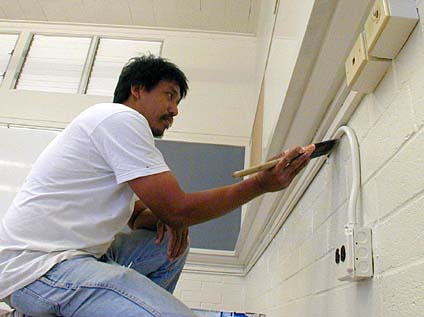
STAR-BULLETIN / 2002
Gov. Linda Lingle is proposing that $539 million be added to a supplemental state budget to address a backlog of repair and maintenance projects, including $90 million for public schools. Tony Bonilla touches up the paint in a Castle High School classroom in 2002.
Construction budget
benefits state, gov saysLingle says job creation and low
interest rates will offset higher costs
Adding half a billion dollars in state construction to an industry already booming with military and civilian housing projects likely will create competition, driving up the costs, but that will be offset with unusually low interest rates, Gov. Linda Lingle said Friday.
"It's a good trade-off," because it will create a lot of higher-paying jobs to bolster the economy and could be an opportunity to former Hawaii residents to come home, she said.
In the supplemental budget sent to the Legislature, Lingle proposed $539 million in construction projects be added, putting the total at just under $850 million.
She acknowledged this could lead to shortages of skilled construction workers, but said the state and labor unions are working on a variety of job training and recruiting projects to meet the demand.
Lingle said one suggestion was that advertisements be placed in Las Vegas newspapers, seeking the return of skilled workers who left the islands during the construction slump.
The state's Department of Labor is working with the Pacific Resources Partnership of the 6,000-member Hawaii Carpenters Union and 400 contractors and the community colleges on training programs, some of which involve federal funds, she said.
"Anytime you are able to create a lot of jobs, that's our goal. We're happy about it. The trades jobs are relatively high-paying jobs," Lingle said. "So, in essence, that's a good problem to have."
The governor said key parts of her construction package to address a backlog of repair and maintenance projects are $90 million more for public schools, $25 million for the University of Hawaii, $50 million for state harbors and $14 million for state parks.
"This problem is not going to go away. You can't ignore it, something has to be done," she said. "We feel you've just got to allocate resources now, and it makes sense because interest rates are relatively low."
Lingle said while the military and civilian housing projects generally involve major contractors, the state's jobs may offer opportunities for medium and smaller companies that previously could not compete.
"Bottom line, it's a good problem that we have created so many jobs that people are talking about will we have enough people to fill them, as opposed to the last decade when we lost 100,000 people because there were no jobs," she said.
